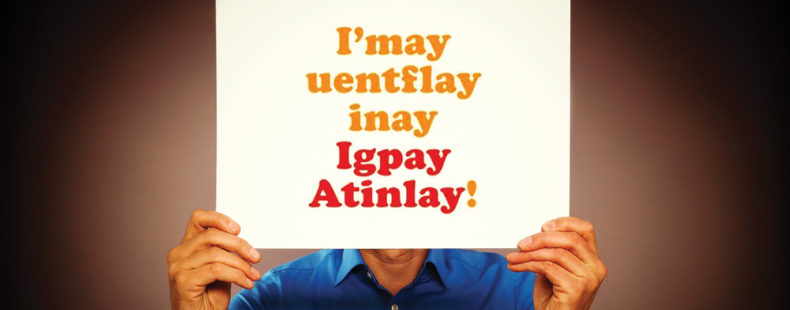It seems like a rite of passage for most kids: your first made-up language. Whether you devised it with a sibling or wrote in a diary only you could translate, there was an allure in concealing your communication in code.
The appeal doesn’t dissipate as we grow older, either. Take Igpay Atinlay. Pig Latin, that is. Plenty of parents still use it to speak about things they don’t want little ears to hear.
Now, you don’t need to be an expert in cryptology to crack Pig Latin (and watch out, parents, when your little ones do), but there are hordes of other invented forms of communication that can be more challenging to those who aren’t in the know.
Where do these secret codes and languages come from, and why do we create them?
It might all start with gibberish
If a made-up language sounds like gibberish to you, that may be the point.
Gibberish is the name of a language game people, often kids, play in which different sounds are inserted at specific points in words. It’s like Pig Latin, but with a twist. For example, the sound –idig- may be inserted after the onset of the syllable of each word, so dog becomes didigog, great becomes gridigeat, and so forth.
In a similar made-up language some call Eggy Peggy, –egg- is added before each vowel, so dog becomes deggog. There are countless variations on the game, all used mostly for fun … though some made-up languages have far more serious purposes, as we’ll discuss next.
Speaking of gibberish, when did that word become a thing? The word gibberish first appeared in the English language in the mid-1500s, referring to written or spoken words that are unintelligible. The word itself is probably meant to imitate the sound of senseless jibber-jabber.
When Gibberish became a language game isn’t quite so clear, though evidence for the term Pig Latin dates to the 19th century. Originally, Pig Latin was a degraded form of Latin (known as hog Latin in the early 1800s and dog Latin in the 1600s), often meant as a parody of Latin to mock people trying to sound smart. (For example, don’t you think we sound mostus smarticus taking about made-up languages?) Pig Latin, for children’s made-up languages, is found in the record by the end of the 1800s.
Made-up languages throughout the years
If you think about it, all languages were made up at some point, if you go back far enough in time. And, we mean pretty far back. Languages as diverse as English and Persian, Greek and Hindi, have all been traced back to a common ancestor, called Proto-Indo-European, believed to have been spoken on the Steppes of Eastern Europe some 5,000–6,000 years ago.
Now, Pig Latin is no Persian, a natural language with tens of millions of speakers, not to mention a complex grammar, sophisticated script, and so on. But, over the years, there have been many made-up languages—or, more broadly, forms of communication—that are incredibly complicated, purposeful, and successful. Here are some examples.
Esperanto
One of the most famous constructed languages is Esperanto. In 1887, a Polish-Jewish ophthalmologist named L.L. Zamenhof wanted to promote peace and cultural unity by giving people an easy-to-learn, universal language to speak. This language, called Esperanto (meaning “one who hopes”), is largely based on European languages. It never achieved Zamenhof’s ultimate goals, but throughout the 20th century, it played a significant role in some international affairs—and has an active community of some two million users today.
Klingon, Dothraki, and other fictional languages
Literature, TV, and film have given us some notable fictional languages. Think the Elvish languages of The Lord of the Rings, Dothraki in Game of Thrones, and Klingon in Star Trek. There are throngs of devoted followers who have taken these languages—meant for entertainment purposes and building out fantasy worlds—and preserved, even expanded them.
For example, did you know there is a Klingon Language Institute? And their oh-so-appropriate motto? Language opens worlds. Or, qoʼmey poSmoH Hol in Klingon. (Don’t ask us to pronounce it. 🖖)
War codes
On a more serious note, codes have long been created in times of war as a secret means of communication. The Nazis famously used Enigma machines to encrypt messages during World War II—until Alan Turing helped crack its seemingly undecipherable code. The United States, meanwhile, employed the lesser-known languages of Native Americans, such as the Navajo, to encode secret messages. It was never broken.
Military slang itself can seem like its own code, from the acronym snafu to whiskey tango foxtrot in the phonetic alphabet. That’s WTF, a form more familiar in …
Textspeak
Other forms of communication are made up for convenience, as is often the case in texting acronyms. Your kids may tell you it’s NOYB (“none of your business”), but textspeak has spread to adult communication, too. OMG, right?
One early form of this internet slang is leetspeak, or 1337, which often substitutes numbers and characters for letters (e.g., n00b for “newbie.”) A more recent form is DoggoLingo, with the cutesy misspelling and bad grammar we use to lavish praise on our pets online. Heckin’ good boi!
Instant messaging and email at work is full of this shorthand so that we can communicate with our peers quickly and clearly without missing a beat. However, when you’re new to the language … it can certainly be a lot tougher to crack than Eggy Peggy.
Professional jargon
That leads us to jargon, which is all that gobbledygook you have to learn when you join an office or profession. Churn. Burn rate. Boil the ocean. If you’re not in business, it can sound like the world is coming to an end. IED. POG. OPTEMPO. If you’re not in the military, it can seem like soldiers are just rearranging the alphabet.
Jargon is a type of specialized vocabulary developed within many professions so that employees across the field can talk to one another about their specific enterprise. Some companies even have glossaries for new employees to explain their vast amount of acronyms, industry-specific terms, and coinages.
Fun fact: When we’re talking about jargon that only a select group of people use, we sometimes refer to it as an argot, a word which has roots in France back in the 1600s (English, mid-1800s) and refers to “a specialized idiomatic vocabulary peculiar to a particular class or group of people.” It was typically used to refer to the language of those not held in the highest of esteem, such as thieves or beggars.
Today, we may more casually refer, say, to the argot of politicians—not that we’re likening them to beggars or thieves or anything. For example, terms like stump, swing state, and pork barrel sound a lot like, well, gibberish if you aren’t in the political know.
Malapropisms and other wordplay
Whether we realize it or not, most of us use a made-up language of our own via malapropisms, neologisms, and wordplay. We may not be trying to fool anyone, but we certainly don’t always limit our word choices to those found within the dictionary’s pages. If you’ve ever thought about eating a cronut with a spork, you get the idea; these blended words were completely made up.
What strange "word" was made up by someone in your family that you still use to this day? #WordTalkWithTheDictionary pic.twitter.com/VGQ8nnouD2
— Dictionary.com (@Dictionarycom) May 4, 2018
Where do all the made-up languages go?
Why do some languages stick and spread and others become endangered or extinct? Languages go the way of the dodo largely because they’re not passed on to younger generations or they’re replaced with other ones. Latin, for instance, evolved into the Romance languages. The languages of many indigenous people, such as Mahican around New York, died out due to colonization.
The same goes for made-up languages: If not enough people are privy to them or they’re not recorded somehow, they peter out, while others will live on indefinitely. For example, you can learn Klingon on the app Duolingo these days, so it’s probably here to stay for a while. But, that language you made up with your BFF in 5th grade (when we didn’t even call them BFFs yet)? You probably don’t even remember it.
The good news is that there are no hard-and-fast rules when it comes to made-up languages. You can always make another one up whenever you like. And why not? YOLO. Or, if you prefer, ouyay onlyyay ivelay onceyay.














